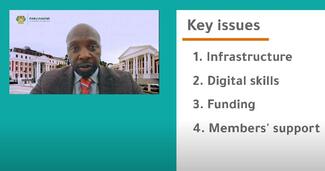- ImpactWe help parliaments to become greener and to implement the Paris agreement.We support democracy by strengthening parliamentsWe work to increase women’s representation in parliament and empower women MPs.We defend the human rights of parliamentarians and help them uphold the rights of all.We help parliaments fight terrorism, cyber warfare and the proliferation of weapons of mass destruction.We encourage youth participation in parliaments and empower young MPs.We support parliaments in implementing the SDGs with a particular focus on health and climate change.
- ParliamentsNearly every country in the world has some form of parliament. Parliamentary systems fall into two categories: bicameral and unicameral. Out of 190 national parliaments in the world, 78 are bicameral (156 chambers) and 112 are unicameral, making a total of 268 chambers of parliament with some 44,000 members of parliament. IPU membership is made up of 180 national parliaments
Find a national parliament
We help strengthen parliaments to make them more representative and effective. - EventsVirtual eventThe International Court of Justice (ICJ) was constituted under the United Nations Charter to help nations settle disputes peacefully in accordance with international law.
- Knowledge
Discover the IPU's resources
Our library of essential resources for parliamentsGlobal data for and about national parliamentsLatest data and reports about women in parliamentResolutions, declarations and outcomes adopted by IPU MembersRecent innovations in the way parliaments workThe latest climate change legislation from the London School of Economics' database
Will hybrid parliaments become the new normal?
On 25 January 2023, the IPU’s Centre for Innovation in Parliament held a webinar as part of the launch of the World e-Parliament Report 2022. The event looked at how the period of “enforced innovation” brought about by the COVID-19 pandemic had affected parliamentary working methods and practices, and at how parliaments that had chosen to innovate had embraced new technologies and remote working. Specifically, the webinar aimed to investigate whether, why and how hybrid working was becoming the “new normal” for parliaments.
Professor Sarah Childs, from the University of Edinburgh, explained that the pandemic had brought pre-existing inequalities into the spotlight, noting its “gender-differentiated impact, particularly around home schooling and other caring responsibilities”. Perhaps as a result of this, the experience of the UK House of Commons was that women MPs were most likely to use both proxy voting and hybrid tools, giving them greater flexibility to participate.
Mr. Leonardo Soto, a member of the Chamber of Deputies of Chile, told the meeting that hybrid proceedings had allowed the chamber to bring in a wider range of knowledge and expertise. Mr. Armands Krauze, a member of the Parliament of Latvia, agreed, noting that hybrid committees provided increased opportunities for civil society participation. While the Parliament of Latvia has largely returned to in-person sittings, some members are still connecting remotely via the e-Saiema app. More generally, the participants agreed that hybridity enhanced the quality not only of debate but also of legislation.
Mr. Rodolfo Vaz, from the Chamber of Deputies of Brazil, noted the benefits of hybrid working for MPs in a geographically large country, where travelling to parliament can be time-consuming, costly and sometimes challenging.
Ms. Neema Lugangira, a member of the National Assembly of the United Republic of Tanzania, supported hybrid sittings but noted that, for them to work, it was necessary to empower women politicians to protect themselves online, including through capacity-building. Evidence suggests that online abuse of women in politics is increasing. Not enough recognition is given to this issue, which hinders women’s participation in politics and creates a barrier to equal access.
Mr. Masibulele Xaso, Secretary to the National Assembly of South Africa, summarized the webinar, observing that, in his view, hybrid working would become the new normal and that the evidence for its benefits was overwhelming. The only question is the extent to which it is used. Ms. Lungangira added that hybrid working was a very important option that parliaments should have ready for use in emergencies, forming a key part of their resilience strategy.
Prof. Childs emphasized that members should have the ability to choose how they wish to participate so long as there was no overall detriment to the functioning of parliament. Looking ahead, she stressed that it was important consolidate what had been achieved while continuing to build on this innovation in order to make parliaments more effective and responsive to both members and the public.
Mr. Xaso explained that, because hybrid sittings had increased accessibility, there had never been any issues with quorums despite limitations on physical access. The experience of the National Assembly of South Africa is that hybrid working can encourage fuller and more diverse participation, as well as greater transparency. He noted, however, that infrastructure needed to be improved, in terms of both nationwide internet access and local systems. Members and staff also require enhanced digital skills in the hybrid world. This presents challenges where funding is limited. The lessons from COVID-19 have also benefited parliamentary staff, with virtual meetings and online tools making parliaments more efficient.
For a hybrid parliament to work seamlessly and effectively, the institution’s rules need to be amended and improved in order to deal with virtual sittings and to ensure that hybrid sessions run safely and reliably.
Watch extracts from the webinar here.
Read the event summary here.





